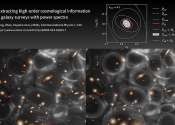The BREAD Collaboration is searching for dark photons using a coaxial dish antenna
Approximately 80% of the matter in the universe is predicted to be so-called "dark matter," which does not emit, reflect, or absorb light and thus cannot be directly detected using conventional experimental techniques.









